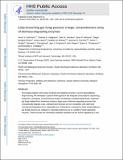Early-branching gut fungi possess a large, comprehensive array of biomass-degrading enzymes
Author(s)
Solomon, Kevin V.; Haitjema, Charles H.; Henske, John K.; Gilmore, Sean P.; Lipzen, Anna; Brewer, Heather M.; Purvine, Samuel O.; Wright, Aaron T.; Theodorou, Michael K.; Grigoriev, Igor V.; Thompson, Dawn A.; O'Malley, Michelle A.; Borges-Rivera, Diego Ramon; Regev, Aviv; ... Show more Show less
DownloadRegev_Early-branching.pdf (1.075Mb)
OPEN_ACCESS_POLICY
Open Access Policy
Creative Commons Attribution-Noncommercial-Share Alike
Terms of use
Metadata
Show full item recordAbstract
The fungal kingdom is the source of almost all industrial enzymes in use for lignocellulose bioprocessing. We developed a systems-level approach that integrates transcriptomic sequencing, proteomics, phenotype, and biochemical studies of relatively unexplored basal fungi. Anaerobic gut fungi isolated from herbivores produce a large array of biomass-degrading enzymes that synergistically degrade crude, untreated plant biomass and are competitive with optimized commercial preparations from Aspergillus and Trichoderma. Compared to these model platforms, gut fungal enzymes are unbiased in substrate preference due to a wealth of xylan-degrading enzymes. These enzymes are universally catabolite-repressed and are further regulated by a rich landscape of noncoding regulatory RNAs. Additionally, we identified several promising sequence-divergent enzyme candidates for lignocellulosic bioprocessing.
Description
available in PMC 2016 November 07
Date issued
2016-03Department
Massachusetts Institute of Technology. Department of BiologyJournal
Science
Publisher
American Association for the Advancement of Science (AAAS)
Citation
Solomon, K. V., C. H. Haitjema, J. K. Henske, S. P. Gilmore, D. Borges-Rivera, A. Lipzen, H. M. Brewer, et al. “Early-Branching Gut Fungi Possess a Large, Comprehensive Array of Biomass-Degrading Enzymes.” Science 351, no. 6278 (February 18, 2016): 1192–1195.
Version: Author's final manuscript
ISSN
0036-8075
1095-9203